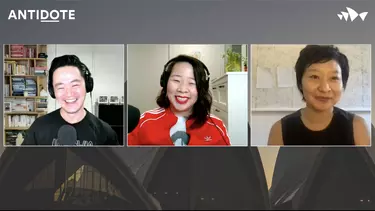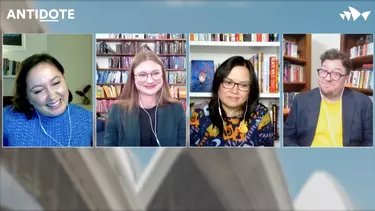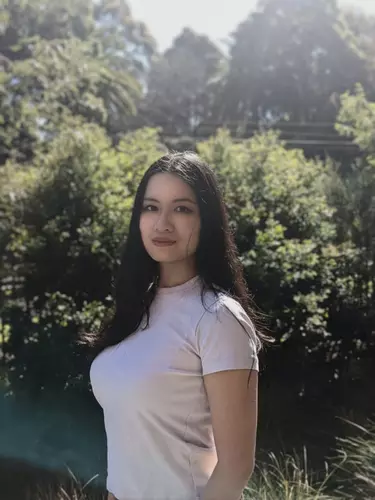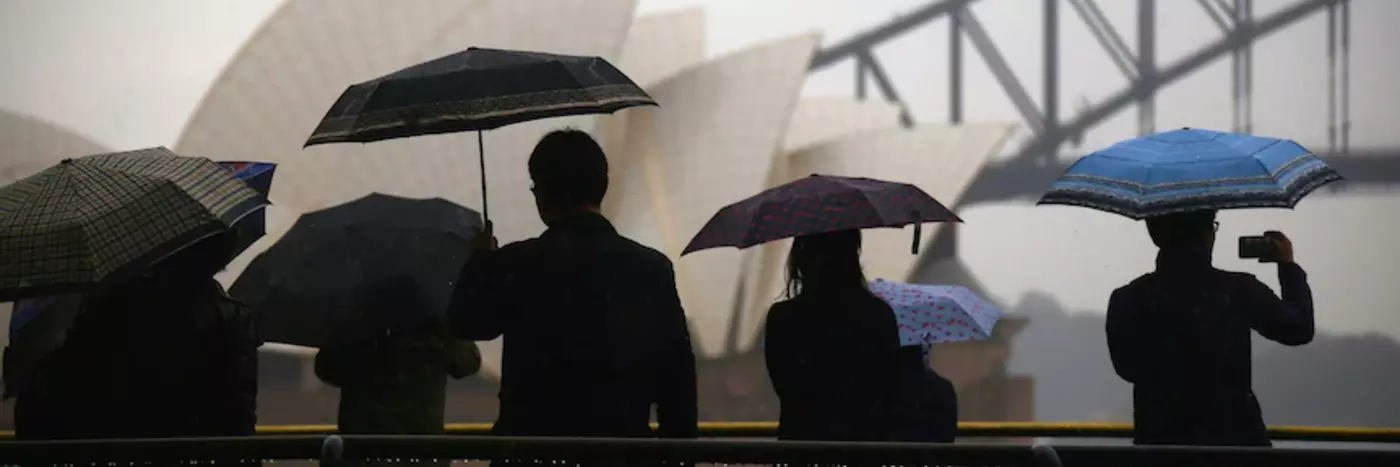Mother tongues and minor feelings
Recipient of the Antidote and Sweatshop Mentorship for Diverse Emerging Writers Joyce Chew on family, migration, language and the “glittering visage of the Australian ‘fair go’”.
Move to Australia as a child. Your parents swap their condo in Singapore for a one-bedroom rental apartment in Western Sydney, placing two beds at right angles and a makeshift air mattress in the middle. To cross your room, you must step through the air mattress. You move, and the ground liquifies beneath your feet.
The land of the ‘fair go’: your parents talk about jobs and money. They work well into dinner times and bedtimes with odd jobs: believers and dreamers, lifters not leaners. A demotion of their careers, a promotion for yours. Your mother is no longer the school’s youngest Head Teacher (and many years later, while more experienced, still is not).
Your family does not say “I love you” like families on TV. Instead, you are asked to eat. Sometimes you say you aren’t hungry (hadn’t they agreed with aunties that you were getting fat?). Sometimes you prefer to barricade yourself in a room with headphones blaring and do not care to hear. You are then asked, or rather commanded, to come down and eat. You do not know it then, but being told to eat persistently, almost aggressively, across three languages (“吃饭!” / “eat already a-not?” / makan) comes from a place of care.
You hear their nice new neighbours ask how they are. You watch your parents smile and nod before they part their lips. Those polite meaningless words. A schoolyard lesson – complain or, worse, speak your mother tongue in public and get asked “Why’d you come to Australia?”. At times variations of this question come from boys who, while not Singaporean, look close enough to pass as your brother.
When I think of growing up, I think of my parents shrinking down.
At times, one of these boys is friendly (and you may have, at one point, almost been kissed as a joke), but you were never friends. Born in Australia, he has a wider, whiter circle of friends and girlfriends, a certain swagger and fondness for rap. He adopts a hybridised accent, alternating between the whitest schoolboy (plays footy “with the legends”) and a blaccent learned from MTV (a continued use of “wassup my n____!”).
Many years later, you stumble across these boys as men in necessary spaces; shopping centres, the odd mutual friend’s party, grocery aisles. On one occasion you exchange small smiles with one of them and he tells you, “you look good”. Online, you come across familiar names in your feed, liking posts about muzzing, shredding, big dogs, Manny Pacquiao. In June 2020, you see these same familiar names liking posts about ‘blue lives matter’, about how racism today isn’t a thing. For a second, your thumb hovers and you pause. And you wonder: do you – for lack of a better word – really ‘unfriend’ a now distant near-forgotten acquaintance?
Many years later offline, stepping through chattering peak hour commuters and clattering trains, thinking of pouring a steaming cup of tea in the office, you look up from the glow of your phone and see him standing, hair gelled and neatly dressed in pressed blue uniform. If either of you recognises the other, neither of you show it.
This is how you are reminded of all those years ago, when one of those boys who could have passed as your brother asked, “Why’d you move here?”. You remember leaning a hand on a wooden fence, jutting your chin, lowering your eyelids and starting to say, “In Singapore, we already spoke English at home, so…”
But as you speak, you also remember asking your parents the same question.

When I think of growing up, I think of my parents shrinking down. Since moving to Australia, my mother and father have known there is a way of speaking and being that eludes them. They are overqualified on paper, underqualified in this place. They say, “we can’t be clever to speak like the Ang Mos”. On one of our first trips back to Malaysia, an aunty rejoiced that my brother and I “sounded Ang Mo” and briefly, I’d wondered if anyone else was relieved.
I am reminded of this while listening to Cathy Park Hong on a #StopAsianHate panel at Antidote. There is a quote from Minor Feelings discussed which is underlined in my own copy, dog-eared on page 76: “To grow up Asian in America is to witness the humiliation of authority figures like your parents and to learn not to depend on them: they cannot protect you”.
In an English Lit class, I remember another student’s passing comment: “I’m giving my thesis to my dad to proofread”. For a second, I was envious (the luxuries of having a proofreader for your work!). This was then followed by guilt. When I first received a piece of writing to proofread at a web publishing gig, one hint was to edit only where necessary; to “let the voice of the writer speak”.
But if you are a migrant or have a migrant-sounding name and are applying for a job, then a typo or displaced comma, a misplaced word or a foreign cadence might mean missing the call, the interview – the chance altogether.

In my teens, I’d cast a wannabe editorial eye on my family’s resumes, a few job interview notes, some report cards, a textbook draft. I’d punctuate the ends of phrases, slash whole sentences in red. I’d wield my pen (mightier than the sword) on paper to cut through my mother’s tongue. I say I did it out of care.
Language is violence and conquest. Command a way of writing and you command a way of being. As a writer and woman of colour, I think of literature and feel both love and loathing. Goodness and guilt. I try to unlearn things; that knee-jerk impulse to re-write and edit where my mother speaks as an Other to English. The impulse to overcorrect (and overreact) when my mother mixes pronouns and switches from “he” to “she” mid-sentence. Or the tilt of my head and dip in my brows when The Simpsons flickers on TV (this was back in the 90s) and my mother points to the screen, makes a tutting noise and says to a cartoon man, “ah, hummus Simpson”.
I am reminded of Cathy Park Hong’s fear of “turning English against my family”. She reflects:
“I have always treated English as a weapon in a power struggle, wielding it against those who are more powerful than me. But I falter when using English as an expression of love.”
When speaking to work friends my mother has learned to switch her Singlish to English. Maybe I’ve taught the teacher. She drops the “lah” at the end of her phrases as well as the “a-nots” but there is a break in rhythm, the syncopated stroke of a drum. We feel these gaps in our bones, my mother and I, like when a pulsing heart skips – for a moment – a beat.
Like cats, we skulk around affection. We do not speak through metaphors, but enact signs and symbols.

Before I type this, I speak with Benjamin Law. I remember he was the first writer I’d read who mentioned Malaysia (my mother’s own motherland) in an Australian magazine. I sheepishly ask something along the lines of if English itself is so deeply rooted in a colonial legacy, how can writers of colour navigate and reconcile this with our practice? He recalls Cathy Park Hong’s approach to confronting English itself (“interrogate the language and fuck it up properly”). We talk about the subversiveness of migrants who speak ‘broken English’ (he calls them “some of the people who use English in the most creative ways”). He uses words that I have never used to describe my own Malaysian mother’s tongue before: “Playful and hilarious”.
I wish I had thought that growing up, when I had felt my parents shrinking down.
My family does not say we love each other. We do not look at each other’s eyes. Like cats, we skulk around affection. We do not speak through metaphors, but enact signs and symbols.
Poetry, says Cathy Park Hong, is “a forgiving medium for anyone who’s had a strange relationship with English”. When it comes to writing fiction, I’ve had practice with the rule of ‘show, don’t tell’. Objects turn into subjects in our household.
What it means to confess without confessing: folded hot laundry, sweets rustling in a shaking bowl. Damp palms cradling a washed peach as though it is a pearl. We guess what is being gestured: A proffering? An apology.
Like a child, I stutter when it comes to writing (speaking and being) in first person, but I try to say something small about slicing my mother’s tongue.
Dear ma,
Gathering white-hot, freshly pressed leaves of paper piling unceremoniously on a laser printer (do you remember?), I skimmed and spell-checked your words for errors. Red ink blooms, blots and clots at my touch.
I have grazed, scarred and torn my mother and father tongues in fistfuls. And I am sorry. I had tried to be careful out of care.

Our mother likes to remind us, “Mummy and daddy moved for you, you know a-not?”. And usually, she also likes to add: “Both lucky children.”
We move to Australia: we find that it is home and it is not. Watching our parents, we learn that luck is hard-earned and easy to lose.
There are those “minor feelings” of Asian identity that Cathy Park Hong describes; feelings that “occur when American optimism is enforced upon you”. We are told “Things are so much better,” while thinking, “Things are the same”.
Like the ‘American Dream’, there is a glittering visage of the Australian ‘Fair Go’. Model minority dwellings; red-bricked rows of McMansions on quiet cul de sacs, carpets of buffalo grass with blades like gleaming emerald teeth. There is the occasional soft throb and throttling of cars; a neighbour’s SUV meandering into a double garage and disappearing behind a concertina electric door that spills and rumbles shut.
If there is a postcard photo for the good migrant, this is it. We’ve risen to the middle of the middle, a jingoistic billboard for the Fair Go Lucky Country -
Should we succeed, turn into the pamphlet of a model minority,
an outlier statistic to parade and parody.
Should we fail, stand in line and amend our error:
try again, fail again and this time fail better.
The worry when a well-meaning friend winks and says he or she “likes Asians” and the worry about whether somebody doesn’t altogether.
The rags-to-riches migrant. The boundless pains we share. That insubstantial pageant.
Perhaps one day our eyes flutter open. Perhaps one day we rise and say: “This shit is the stuff our remarkable, marketable middle-class migrant dreams are made of.”
We have learned not to complain. We tell ourselves that unlike our mothers, predecessors and others, we have not known enough suffering. Or more simply that we ourselves are not enough.
But sometimes there is a minor event or moment that stirs us; the twinge when we are the only woman of colour in a meeting, a bar or in a class on postcolonial literature; or when another child runs through the schoolyard and tells us, “My mum can’t understand your mum on the phone”. The worry when a well-meaning friend winks and says he or she “likes Asians” and the worry about whether somebody doesn’t altogether. It comes when we must describe to a panel of men who do not look like our fathers how a white boy who looks like their son has hurt us. It comes when a report is returned to us and a typo or misplaced word is somehow attributed to our names.
We feel, and then we quietly remind ourselves not to. We tell ourselves that this is a minor event and that things could be worse: “Aren’t we, after all, the lucky ones?”
